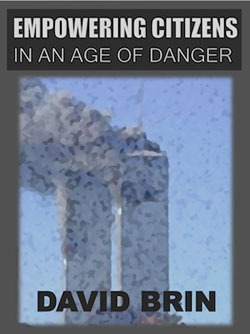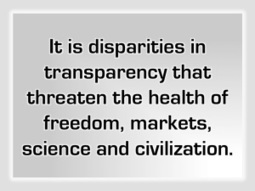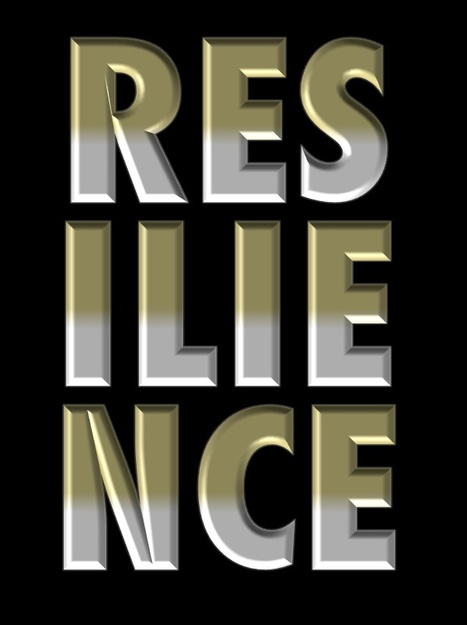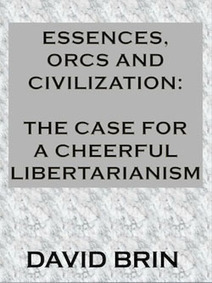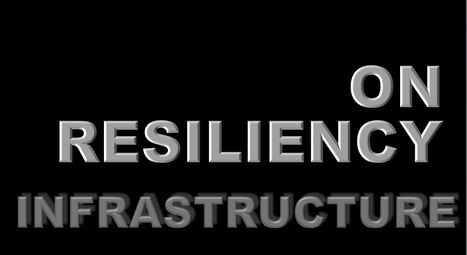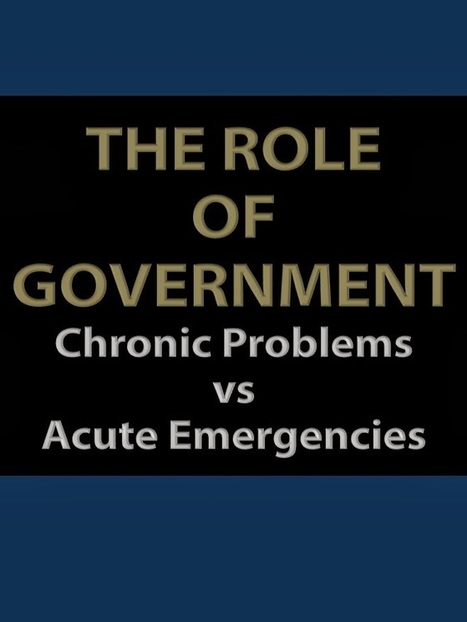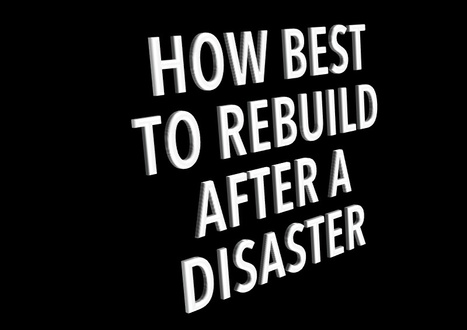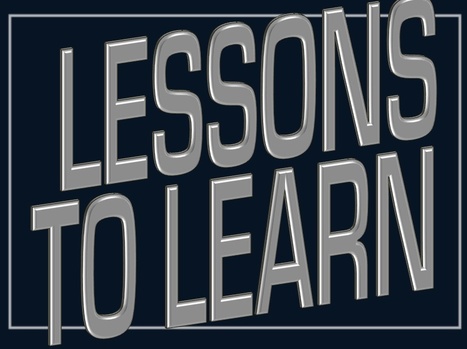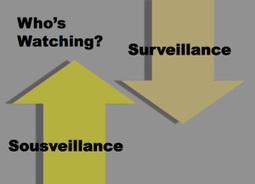 Your new post is loading...
 Your new post is loading...

|
Scooped by
GDB
|
Throughout the 20th Century, the trend in our culture was monotonic, toward ever-increasing reliance on protection and coddling by institutions, formally deliberated procedures and official hired guns... none of which availed us at all on September 11, 2001. Rather, events that day seem to suggest a reversal, toward the older notion of a confident, self-reliant citizenry.

|
Scooped by
GDB
|
The resilience of our entire civilization is increasingly reliant on a fragile network of cell phone towers, which are the first things to fail in any crisis, e.g. a hurricane or other natural disaster… or else deliberate (e.g.EMP or hacker) sabotage.
I have been nagging about this for almost two decades. My recommendation — offered to national and corporate leaders since 1995? That our pocket phones should have a backup communication mode that is peer-to-peer, that could pass messages from phone to phone through any afflicted area until they reach a zone with cell service, at which point the messages would spill into the continental network.

|
Scooped by
GDB
|
Our professional protectors (defense, intelligence, etc) stress "anticipation" of plausible threats. Laudable. But this mind set exposes unseen gaps in preparing to withstand unexpected dangers. We must anticipate in order to detect and deter -- particularly for non-traditional foes and failure modes. Most foes share one weakness: a near-mortal allergy to accountability and light. Our most powerful tools for dealing with an uncertain future: anticipation and resiliency.

|
Scooped by
GDB
|
Boosting resilience should be a top priority. Restoring our military reserves should be only the beginning. If we are serious about preparing for dangerous times, more should be done to deepen the supply of Americans who are ready to help, rather than be helpless, in future crises. This principle holds fast to a basic, grassroots spirit that was the hallmark of the Obama Campaign -- and to traditions that go all the way back through American history. It certainly ought to be a basic theme of the new administration. Here are just a few (of many) examples that have critical implications for the nation's defense and (ultimately) survival:

|
Scooped by
GDB
|
I have called New Orleans the 'anti-9/11' because these two tragedies illustrate diametrically opposite sides of the same lesson. When resilient citizens feel empowered, they can be prodigious assets in a crisis. In fact, the one truly significant thing that happened on 9/11, other than the attack itself, was a staggering display of citizen courage, autonomy and competence, on a day when all of the paid professional protector castes failed. Almost every major action that worked that day -- to limit the harm, evacuate victims, palliate suffering, document the event and fight back against our enemies -- was performed by independent citizen amateurs, empowered by modern technologies and an adaptable will to use them.

|
Scooped by
GDB
|
It was access to communications that enabled New Yorkers to show the incredible citizen resilience on 9/11. We need to help the Protector Caste without leaving us citizens reduced to impotence, to the level of bleating sheep, bereft of tools exactly when we need them most. I have long pointed out that access to communications was the trait them empowered New Yorkers and the brave volunteers on flight UA93, in contrast to the disastrous consequences of communications breakdown, after Katrina and Fukushima.

|
Scooped by
GDB
|
What conditions are essential for civilized behavior - both in normality and in crisis?
I believe there are two fundamental ingredients.
1- accountability for those who would be predators
2- empowerment for those who would either compete fairly or cooperate vigorously for the common good. (Especially the kind of empowerment that lets individuals hold others (including elites) accountable.)

|
Scooped by
GDB
|
The EMP-vulnerability of our electric grid, our machines, transportation systems, tools and homes, is probably the most glaring, "acute-impact" threat on our horizon -- an event that could possibly knock us flat in a single day, or instant. Those of us with memories of the Cold War know how it feels to be constantly aware of a Damoclean Sword, hanging overhead..

|
Scooped by
GDB
|
On 9/11, failure came about as an unfortunate confluence of many factors, some of which weren’t anybody’s fault, all uniting to create a sudden and very brief Perfect Storm. Isolated acts of incompetence combined with sheer bad luck - plus enemy innovativeness - to make Professional Anticipation fail at all levels. What 9/11 did prove was an age-old adage, that even the best anticipators only succeed some of the time. Inevitably, no matter how skilled, anticipation will fail.And when that happens - when surprise comes at us like a ton of bricks - we must fall back on the other thing. Anticipation’s partner, in helping human beings to deal with the shocks of an onrushing future.

|
Scooped by
GDB
|
Rebuilding Haiti means not only recovering from the earthquake but also building infrastructure for the future: It’s when we start talking about longer-term solutions that the discussion gets clouded by preconceptions, dogma and real-world practicalities. Sixty years after the Marshall Plan proved that foreign assistance can work, some of the time, we still find our best-meant schemes mired by bureaucratic inefficiency, corruption, and unintended consequences. Nor does any political side have a perfect recipe. If the American left has often shown itself to be treacly and naive, the right is already back to its old, cynical sneer, deriding “the failed and discredited utopian fantasy of so-called Nation Building” — an actual neoconservative mantra, up till the very month that they plunged the U.S. into the most costly, inefficient, corruption-ridden and ill-conceived nation-building exercise ever undertaken. Now, the mantra that went dormant for a while is back.

|
Scooped by
GDB
|
Take, for example, the tragic events of September 11, 2001. A central fact that's been overlooked ever since, by nearly every fashionable pundit, is this: every truly effective action that was taken on that awful day -- to palliate the harm and thwart our enemies -- was performed by private individuals. Citizens who proved themselves to be far more agile, imaginative and resourceful than any of society's elites picture them to be! Most of the useful video footage was taken by private parties, armed with the new equalizers -- cameras -- a potentially crucial element in future emergencies. Private cell phones spread word quicker than official media, including crucial calls for evacuation and rebellion. So did email and instant messaging, when the phone system got swamped. Potentially harmful rumors were swiftly debunked by independent "urban legend" or hoax-busting web sites, taking on a role that government can never be trusted with. A role unsuitable for any highly-vested class. Swarms of volunteers descended on the disaster sites, as local officials quickly dropped their everyday concerns about liability or professional status in order to use all willing hands. Finally, the sole immediate action that effectively thwarted terrorist plans was taken aboard United Flight 93, by individuals armed with intelligence and communication tools -- and a mandate -- completely outside official channels.
|

|
Scooped by
GDB
|
Many people today are concerned about critical infrastructures such as the electrical network, water supplies, telephones, transportation, and the Internet. These nerve and bloodlines for society depend on reliable computing, communications, and electrical supply. What would happen if a massive cyber attack or an electromagnetic pulse, or other failure mode took down the electric grid in a way that requires many months or even years for repair? What about a natural disaster such as hurricane, wildfire, or earthquake that disabled all cellphone communications for an extended period? David Brin, physicist and author, has been worrying about these issues for a long time and consults regularly with companies and federal agencies. He says there are many relatively straightforward measures that might greatly increase our resiliency—our ability to bounce back from disaster.

|
Scooped by
GDB
|
For example, besides providing basic security, justice and enforcement of contracts, government also does pretty well at tackling certain types of infrastructure, emergency preparedness (when public officials do their jobs) and handling ACUTE EMERGENCIES. (Kill Hitler, feed THESE children right now, go to the moon.) Acute needs are often driven by consensus desires that are simply not measurable in terms of ROI.
Government tends to do much worse when taking on CHRONIC PROBLEMS. (e.g. constantly improving our refrigerators or entertainments in response to public taste, providing longlasting and productive jobs, making poverty vanish, creating an ongoing profitable human presence in space.) These are far better handled by a market... perhaps with fine-tuning to ensure that it really is profitably attractive for private capital to step in and address long term needs.

|
Scooped by
GDB
|
In fact, history shows that anticipation - no matter how well-done - always and inevitably fails, sooner or later. (As it did on 9/11, Katrina, and in the run-up to Iraq.) We need to supplement professionals with citizen-oriented systems and technologies that could dramatically augment America’s emergency-response capabilities, by returning some traditional emphasis to resilience.

|
Scooped by
GDB
|
The nation and public would benefit -- particularly in times of crisis -- by adding peer-to-peer supplemental capabilities to the present cell system.
Some object that this development could cost millions. But that is not any real obstacle in an industry making hundreds of billions in the US alone. If either the government or the cell companies saw a clear benefit model, it would be trivial to justify the relatively small expense. Certainly far smaller than incorporating web browsers and MP3 players!

|
Scooped by
GDB
|
Is it possible that NOW may be the right time to let the river go? There have always been benefits and drawbacks to this idea, with the political balance invariably choosing to leave things as they were... spending hundreds of millions to keep forcing Ol' Miss down its old channel, which continues silting and rising. (Today, the river's BOTTOM now lies above the second floor of some NoLa buildings. Shall we keep fighting nature till a syrup-sluggish flow passes the THIRD floor? Fourth? Any higher and the river will flow backwards!)

|
Scooped by
GDB
|
Across the 20th Century, a growing array of problems were solved through the application of professional skill. We came to rely increasingly upon professions ranging from medical doctors to law enforcement, from teachers to farmers for countless tasks that an average family used to do largely for itself. No other trend so perfectly represents the last century as this one, spanning all boundaries of politics, ideology or geography.
And yet - just as clearly - this trend cannot continue much longer. If only for demographic reasons, the as the rate of professionalization and specialization must start to fall off, exactly as we are about to face a bewildering array of new -- and rapid-onrushing -- problems

|
Scooped by
GDB
|
One might have expected FEMA to be enhanced after 9/11, with critical attention paid to general flexibility - our ability to respond well to any national emergency, including - but not limited to - terrorism. Before Iraq, drills involving federal state and local agencies had uncovered countless command flaws of the very kind that we saw emerge, tragically, during Katrina. But contrary to assurances made at the highest levels, this process of drills and contingency planning ebbed after 9/11, with budgets transferred to Iraq.

|
Scooped by
GDB
|
Despite the President’s protest that “nobody expected levees to break”... the people of New Orleans knew something like this was looming. As illustrated by the predictions of countless local officials... as well as a silly sci fi author, years ago... the recent calamitous loss of an entire American city was not unexpected. The citizens of NoLa asked for help, often.

|
Scooped by
GDB
|
How many people died with fully-charged, sophisticated pocket-radios in their hands, trying desperately to send a text message that said “Help! I am buried at _____”? How many more will perish, when calamity strikes, time and time again around the world, because victims find themselves trapped in a disaster area where the cell system has gone down? Are you satisfied with a system that not only can let you down in an emergency, but that is absolutely guaranteed to fail, at some time of dire crisis, when you need it most? If you aren’t satisfied with that prospect, what do you plan to do about it?

|
Scooped by
GDB
|
The protective agencies can be expected to continue pressing for better surveillance methods, both in pursuit of a professional ability to do their jobs and as a natural outcome of human psychology. They will never give up because we monkeys need to see and powerful ones won't be denied. If forbidden, they will simply peer at us surreptitiously. Robert Heinlein said: "Privacy laws make the spy bugs smaller.
Adverse action against private citizens by potential Big Brothers can best be prevented by turning the Telescreen so that it peers in both directions. This is the only proved method; it is the way that we have had the win-win of modern society so far. It is the only scenario that can possibly continue to work.

|
Scooped by
GDB
|
Can anyone honestly claim that we're better prepared, today, to deal with a surprise attack, or an urgent call for help from some ally, than we were before 9/11? Or, in fact, any other kind of emergency? Would our allies now be more ready to leap to our aid than before 2001? Or much less so? Consider the fundamental premise that underlies many of the recent developments in US military doctrine, from our all-volunteer Army to incredible improvements in education and training levels, from the force-multiplying effects of high technology and mobility to a daunting proliferation of strange and unprecedented new kinds of threats, each requiring new technological response.
|


 Your new post is loading...
Your new post is loading...
 Your new post is loading...
Your new post is loading...



